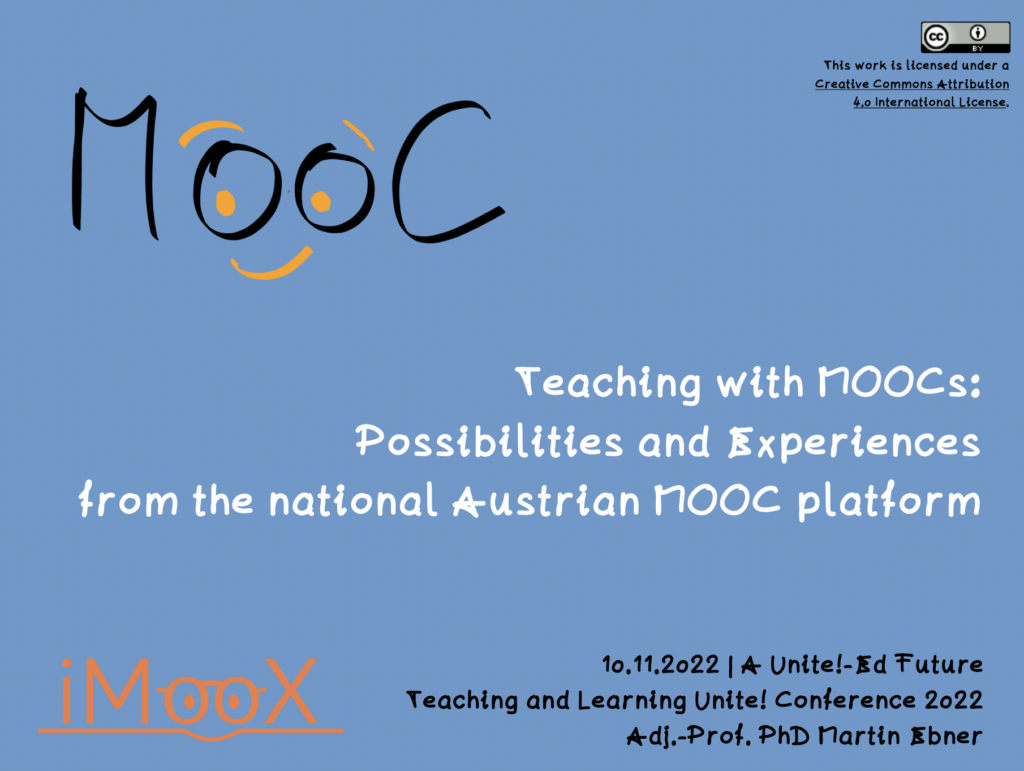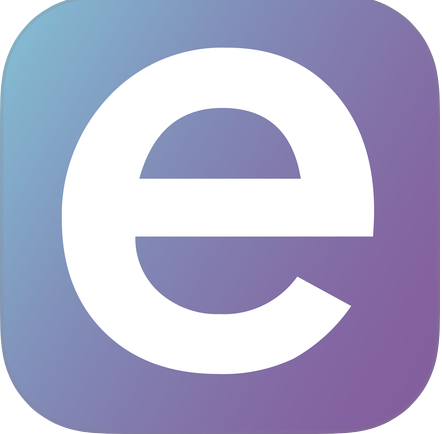I am happy to give a short talk about iMooX.at at the A Unite!-Ed Future – Teaching and Learning Unite! Conference 2022 and to present our UNITE! partners the possibilities of our MOOC-platform. Here you can find my slides:


Digitale Lehre an und rund um der Technischen Universität Graz
We are happy to announce a new MOOC start with the title „Challenge Based Learning in Higher Education“ of the University of Graz:
Challenge-based learning is an innovative active approach to teaching and learning which is comparatively new to higher education.
This MOOC helps you to develop competences needed to introduce challenge-based learning into your own teaching practice.
Here you can find the trailer:
Participation is as usual completly free, so feel free to register and join: [Link to enroll to the course]
Wir haben in einem Beitrag für das E-Learning Handbuch unsere langjährige Erfahrungen zusammen geschrieben, um damit einen besseren Überblick über die Notwendigkeit von Learning Experience Design in Zusammenhang mit den Lehr- und Lernsystemen der Zukunft zu geben.
Zusammenfassung:
Learning Experience Design (LXD), also die bewusste, auf Grundlagen und Methoden der Designdisziplin erfolgten Gestaltung von Lernerfahrungen, ist ein Begriff der immer häufiger bei der Gestaltung von (digitalen) Lernumgebungen genannt wird. Zielsetzung ist dabei, das Lernen zu einer positiven, spannenden Erfahrung für die Lerner/innen zu machen. Dieser Beitrag beschreibt den Prozess des Learning Experience Designs im deutschsprachigen Raum und erläutert, wie sich diese Designdisziplin zur Gestaltung von Lernerfahrungen mit Lernenden anwenden lässt und nennt Bezüge zu Design im Allgemeinen, Learning Experience Design, Interaction Design, User Experience Design sowie Grafikdesign. Es werden dazu Fachbegriffe erläutert, Abläufe, Methoden und Verfahren zur Umsetzung, sowie zahlreiche Beispiele, u.a. aus unterschiedlichen Umsetzungen der Technischen Universität Graz (TU Graz) dargestellt. Der Beitrag schließt mit einer Beschreibung von Herausforderungen sowie einen Ausblick auf die aktuellen Professionalisierungsbestrebungen und -entwicklungen.
Referenz: Jacqueline Kircher, Eva-Maria Burger, Martin Ebner und Sandra Schön (2021). Learning Experience Design – zur Gestaltung von technologiegestützten Lernerfahrungen mit Methoden der Design-Entwicklung. In K. Wilbers & A. Hohenstein (Hrsg.), Handbuch E- Learning. Expertenwissen aus Wissenschaft und Praxis – Strategien, Instrumente, Fallstudien, 93. Erg.-Lfg. Oktober 2021, Beitrag 4.78.
We produced a folder as a short overview about our research work with MOOCs called „Seven teaching and learning scenarios with MOOCs„. The research based on interviews with educational experts and their work with MOOCs over 5 years.
The folder is available in english and german on slideshare (for embedding) as well as .pdf (for download):
Klicken Sie auf den unteren Button, um den Inhalt von www.slideshare.net zu laden.
Klicken Sie auf den unteren Button, um den Inhalt von www.slideshare.net zu laden.
[Download folder (english) (.pdf)]
[Download folder (german) (.pdf)]
Our publication about „Why Will Technology Enhanced Language Learning be Essential for Pupils?“ got published in the Bulletin of the Technical Committee on Learning Technology.
Abstract:
The availability of personal digital devices in schools and at home are offering new ways of engaging students in the area of language learning. In this publication, we present a new approach on writing and blogging for children aged 8 to 12 years, which is especially helpful for those who struggle with the acquisition of German orthography. On a web-based platform the pupils can write essays and blog them later on. Combined with learning analytics methods we offer individualized feedback during the process of writing and a training database with appropriate exercises to support the students‘ autonomous learning.
[Article @ Journal’s Homepage]
Reference: Ebner, M., Ebner, M., Edtstadler, K. (2019) Why Will Technology Enhanced Language Learning be Essential for Pupils?. Bulletin of the Technical Committee on Learning Technology. 2019/1. pp. 14-17
In July I will give a short webinar about „Learning and instruction videos: design, production, use“ based on our long tradition in doing videos especially for the MOOC-platform iMooX.at:
The talk comes up with the topic of learning and instruction videos and shows the current forms of application. Different formats as well as creation possibilities are presented, which can be converted by today’s technologies partly also with manageable financial resources. In addition, theoretical approaches concerning the instructional design are addressed. In order to facilitate the production of learning and instructional videos in the future, a template for the development of learning and instructional videos, the „Learning-Video-Canvas“, shows how to approach the planning of video projects for learning issues.
The participation is free and I like to thank the eduhub-community for hosting this talk: [Free registration for the webinar]
 Issue 14(3) of our journal on emerging technologies for learning got published. Enjoy the readings as usual for free :-).
Issue 14(3) of our journal on emerging technologies for learning got published. Enjoy the readings as usual for free :-).
Table of Contents:
Nevertheless, if you are interested to become a reviewer for the journal, please just contact me :-).
It is a great honor to announce a Special Call for Papers for the county slot (Austria) at this year ED-Media conference in Amsterdam. We are searching for excellent research publications in the field of Technology Enhanced Learning. Please feel free to send us our proposal (Abstract) till 14th of December 2018.
 Im Rahmen unserer Veranstaltung ist eine kleine, aber feine Lernapp entstanden, mit der man verschiedenste Lektionen durchführen kann. Im Vordergrund stand zwar das generelle Ertesten wie man Apps erstellt, aber vielleicht hat jemand auch an der App selbst Spaß:
Im Rahmen unserer Veranstaltung ist eine kleine, aber feine Lernapp entstanden, mit der man verschiedenste Lektionen durchführen kann. Im Vordergrund stand zwar das generelle Ertesten wie man Apps erstellt, aber vielleicht hat jemand auch an der App selbst Spaß:
Eduludo allow you to learn mathematics, english, french and german for free.
In our app:
- 100% offline based. You’ll have to resolve challenges in each course, once you think you have the answer, just type it to see the result!
- Multiple profile! You have the possibility to use 7 different slots for keeping your progress.
- Perfect for children/home-schooler/ people wanting to improve their skills.
- More than 50 challenges to solve!